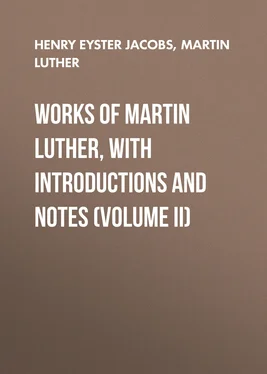Henry Eyster Jacobs - Works of Martin Luther, with Introductions and Notes (Volume II)
Здесь есть возможность читать онлайн «Henry Eyster Jacobs - Works of Martin Luther, with Introductions and Notes (Volume II)» — ознакомительный отрывок электронной книги совершенно бесплатно, а после прочтения отрывка купить полную версию. В некоторых случаях можно слушать аудио, скачать через торрент в формате fb2 и присутствует краткое содержание. Жанр: foreign_prose, foreign_religion, Философия, foreign_psychology, foreign_antique, на немецком языке. Описание произведения, (предисловие) а так же отзывы посетителей доступны на портале библиотеки ЛибКат.
- Название:Works of Martin Luther, with Introductions and Notes (Volume II)
- Автор:
- Жанр:
- Год:неизвестен
- ISBN:нет данных
- Рейтинг книги:3 / 5. Голосов: 1
-
Избранное:Добавить в избранное
- Отзывы:
-
Ваша оценка:
- 60
- 1
- 2
- 3
- 4
- 5
Works of Martin Luther, with Introductions and Notes (Volume II): краткое содержание, описание и аннотация
Предлагаем к чтению аннотацию, описание, краткое содержание или предисловие (зависит от того, что написал сам автор книги «Works of Martin Luther, with Introductions and Notes (Volume II)»). Если вы не нашли необходимую информацию о книге — напишите в комментариях, мы постараемся отыскать её.
Works of Martin Luther, with Introductions and Notes (Volume II) — читать онлайн ознакомительный отрывок
Ниже представлен текст книги, разбитый по страницам. Система сохранения места последней прочитанной страницы, позволяет с удобством читать онлайн бесплатно книгу «Works of Martin Luther, with Introductions and Notes (Volume II)», без необходимости каждый раз заново искать на чём Вы остановились. Поставьте закладку, и сможете в любой момент перейти на страницу, на которой закончили чтение.
Интервал:
Закладка:
That it may not so fare with us and our noble young Emperor Charles, we must be sure that in this matter we are dealing not with men, but with the princes of hell, who can fill the world with war and bloodshed, but whom war and bloodshed do not overcome. We must go at this work despairing of physical force and humbly trusting God; we must seek God's help with earnest prayer, and fix our minds on nothing else than the misery and distress of suffering Christendom, without regard to the deserts of evil men. Otherwise we may start the game with great prospect of success, but when we get well into it the evil spirits will stir up such confusion that the whole world will swim in blood, and yet nothing will come of it. Let us act wisely, therefore, and in the fear of God. The more force we use, the greater our disaster if we do not act humbly and in God's fear. The popes and the Romans have hitherto been, able, by the devil's help, to set kings at odds with one another, and they may well be able to do it again, if we proceed by our own might and cunning, without God's help.
[Sidenote: The Three Walls Described]
The Romanists 109 109 The term "Romanist" is applied by Luther to the champions of the extreme form of papal supremacy. C. Vol. I, p. 343 f.
, with great adroitness, have built three walls about them, behind which they have hitherto defended themselves in such wise that no one has been able to reform them; and this has been the cause of terrible corruption throughout all Christendom.
First , when pressed by the temporal power, they have made decrees and said that the temporal power has no jurisdiction over them, but, on the other hand, that the spiritual is above the temporal power. Second , when the attempt is made to reprove them out of the Scriptures, they raise the objection that the interpretation of the Scriptures belongs to no one except the pope. Third, if threatened with a council, they answer with the fable that no one can call a council but the pope.
In this wise they have slyly stolen from us our three rods 110 110 i. e., The three rods for the punishment of an evil pope.
, that they may go unpunished, and have ensconced themselves within the safe stronghold of these three walls, that they may practise all the knavery and wickedness which we now see. Even when they have been compelled to hold a council they have weakened its power in advance by previously binding the princes with an oath to let them remain as they are. Moreover, they have given the pope full authority over all the decisions of the council, so that it is all one whether there are many councils or no councils,—except that they deceive us with puppet-shows and sham-battles. So terribly do they fear for their skin in a really free council! And they have intimidated kings and princes by making them believe it would be an offence against God not to obey them in all these knavish, crafty deceptions 111 111 Spuknisse , literally "ghosts." The gist of the sentence is, "the Romanists have frightened the world with ghost-stories."
. Now God help us, and give us one of the trumpets with which the walls of Jericho were overthrown [Josh. 6:20], that we may blow down these walls of straw and paper, and may set free the Christian rods or the punishment of sin, bringing to light the craft and deceit of the devil, to the end that through punishment we may reform ourselves, and once more attain God's favor.
Against the first wall we will direct our first attack.
[Sidenote: The First Wall—the Spiritual Estate above the Temporal]
It is pure invention that pope, bishops, priests and monks are to be called the "spiritual estate"; princes, lords, artisans, and farmers the temporal estate. That is indeed a fine bit of lying and hypocrisy. Yet no one should be frightened by it; and for this reason—viz., that all Christians are truly of the "spiritual estate," and there is among them no difference at all but that of office, as Paul says in I Corinthians xii. We are all one body, yet every member has its own work, whereby it serves every other, all because we have one baptism, one Gospel, one faith, and are all alike Christians [1 Cor. 12:12 ff.]; for baptism, Gospel and faith alone make us "spiritual" and a Christian people.
[Sidenote: The Priesthood of Believers]
But that a pope or a bishop anoints, confers tonsures, ordains, consecrates, or prescribes dress unlike that of the laity,—this may make hypocrites and graven images 112 112 Olegötze —"an image anointed with holy oil to make it sacred"; in modern German, "a blockhead."
, but it never makes a Christian or "spiritual" man. Through baptism all of us are consecrated to the priesthood, as St. Peter says in I Peter ii, "Ye are a royal priesthood, a priestly kingdom," [1 Pet. 2:9] and the book of Revelation says, "Thou hast made us by Thy blood to be priests and kings." [Rev. 5:10] For if we had no higher consecration than pope or bishop gives, the consecration by pope or bishop would never make a priest, nor might anyone either say mass or preach a sermon or give absolution. Therefore when the bishop consecrates it is the same thing as if he, in the place and stead of the whole congregation, all of whom have like power, were to take one out of their number and charge him to use this power for the others; just as though ten brothers, all king's sons and equal heirs, were to choose one of themselves to rule the inheritance or them all,—they would all be kings and equal in power, though one of them would be charged with the duty of ruling.
To make it still clearer. If a little group of pious Christian laymen were taken captive and set down in a wilderness, and had among them no priest consecrated by a bishop, and if there in the wilderness they were to agree in choosing one of themselves, married or unmarried, and were to charge him with the office of baptising, saying mass, absolving and preaching, such a man would be as truly a priest as though all bishops and popes had consecrated him. That is why in cases of necessity any one can baptise and give absolution 113 113 Lay-baptism in view of imminent death is a practice as old as the Christian Church. The right of the laity to administer baptism in such cases was expressly recognized by the Council of Elvira, in the year 306, and the decree of that Council became a part of the law of the Church. The right of the laity to give absolution in such cases rests on the principle that in the absence of the appointed official of the Church any Christian can do for any other Christian the things that are absolutely necessary or salvation, for "necessity knows no law." Cf. Vol. I, p. 30, note 2.
, which would be impossible unless we were all priests. This great grace and power of baptism and of the Christian Estate they have well-nigh destroyed and caused us to forget through the canon law 114 114 The canon law, called by Luther throughout this treatise and elsewhere, the "spiritual law," is a general name for the decrees of councils ("canons" in the strict sense) and decisions of the popes ("decretals," "constitutions," etc.), promulgated by authority of the popes, and collected in the so-called Corpus juris canonici . It comprised the whole body of Church law, and embodied in legal forms the mediæval theory of papal absolutism, which accounts for the bitterness with which Luther speaks of it, especially in this treatise. The Corpus includes the following collections of canons and decretals: The Decretum of Gratian (1142), the Liber Extra (1234), the Liber Sextus (1298), the Constitutiones Clementinae (1318 or 1317), and the two books of Extravagantes ,—the Extravagantes of John XXII , and the Extravagantes communes . The last pope whose decrees are included is Sixtus IV (died 1484). See Catholic Encyclop. ,IV, pp. 391 ff.
. It was in the manner aforesaid that Christians in olden days chose from their number bishops and priests, who were afterwards confirmed by other bishops, without all the show which now obtains. It was thus that Sts. Augustine 115 115 Augustine, the master-theologian of the Ancient Church, bishop of Hippo in Africa from 395-430.
, Ambrose 116 116 Ambrose, bishop of Milan from 374-397, had not yet been baptised at the time of his election to the episcopate, which was forced upon him by the unanimous voice of the people of the city.
and Cyprian 117 117 Cyprian, bishop of Carthage, 247-258, is said to have consented to accept the office only when the congregation surrounded his house and besought him to yield to their entreaties.
became bishops.
Интервал:
Закладка:
Похожие книги на «Works of Martin Luther, with Introductions and Notes (Volume II)»
Представляем Вашему вниманию похожие книги на «Works of Martin Luther, with Introductions and Notes (Volume II)» списком для выбора. Мы отобрали схожую по названию и смыслу литературу в надежде предоставить читателям больше вариантов отыскать новые, интересные, ещё непрочитанные произведения.
Обсуждение, отзывы о книге «Works of Martin Luther, with Introductions and Notes (Volume II)» и просто собственные мнения читателей. Оставьте ваши комментарии, напишите, что Вы думаете о произведении, его смысле или главных героях. Укажите что конкретно понравилось, а что нет, и почему Вы так считаете.












